【词,句重难点课件】 人教版(2019)Unit 3 Period Ⅱ Learning About Language 选择性必修二
文档属性
| 名称 | 【词,句重难点课件】 人教版(2019)Unit 3 Period Ⅱ Learning About Language 选择性必修二 |
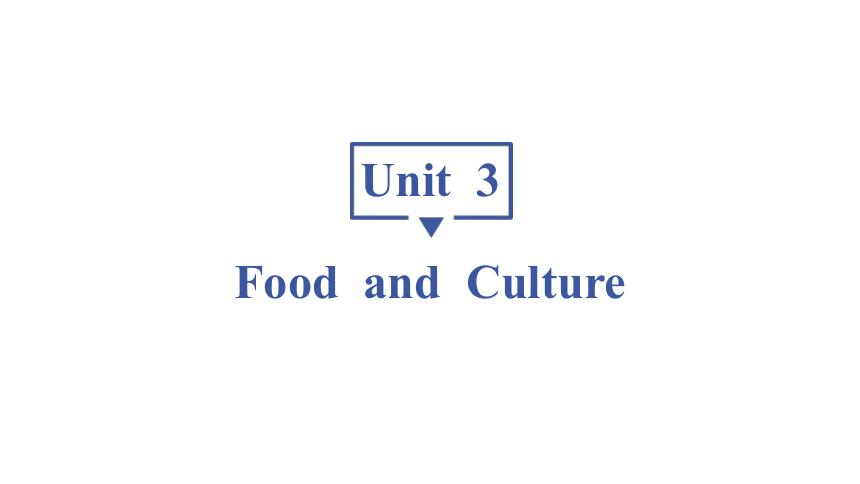
|
|
| 格式 | pptx | ||
| 文件大小 | 235.1KB | ||
| 资源类型 | 试卷 | ||
| 版本资源 | 人教版(2019) | ||
| 科目 | 英语 | ||
| 更新时间 | 2023-05-13 00:00:00 | ||
图片预览

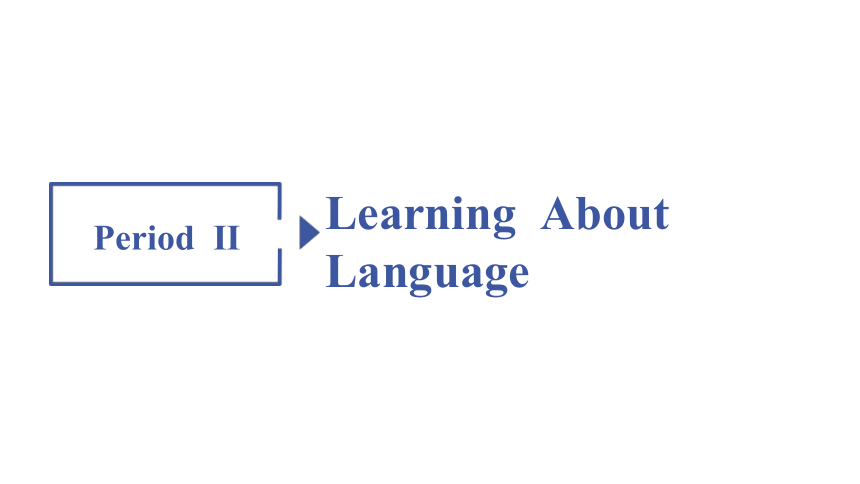
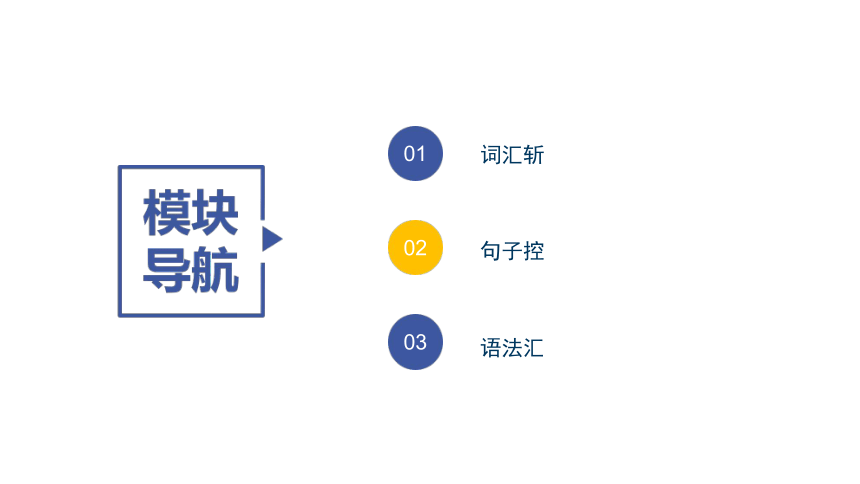
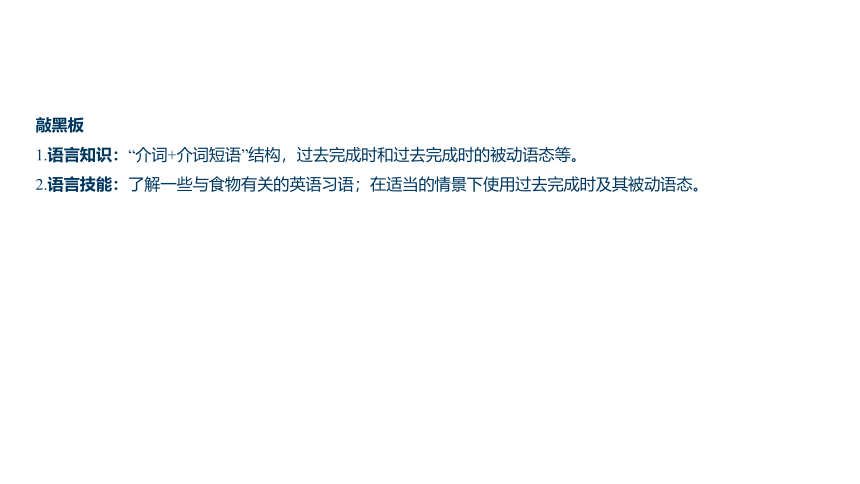

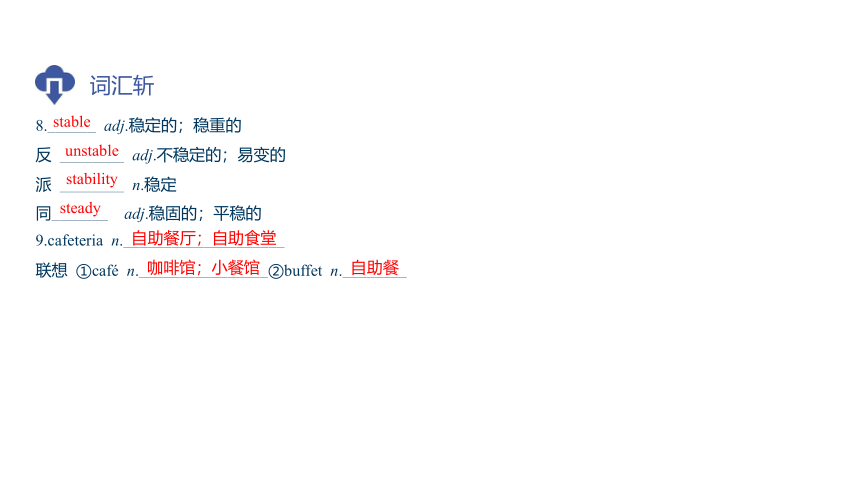
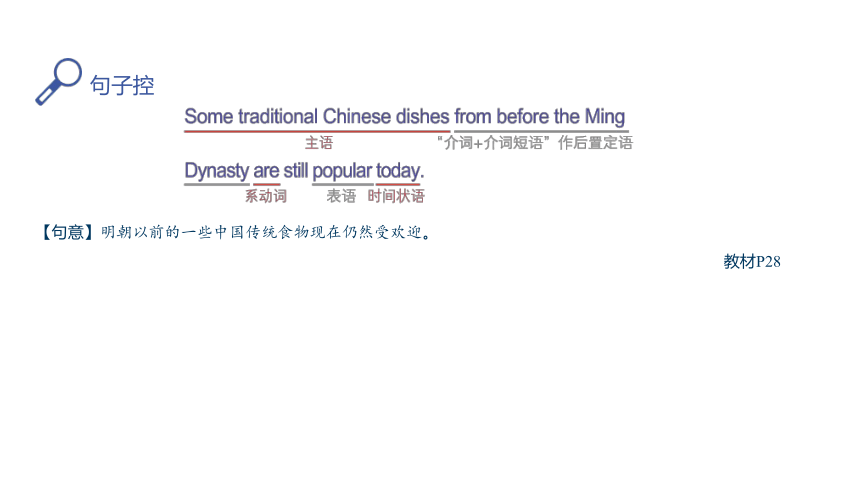
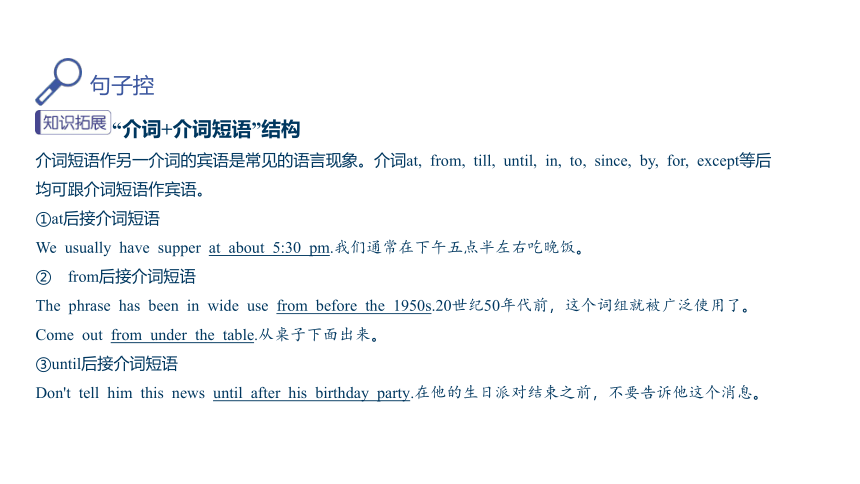
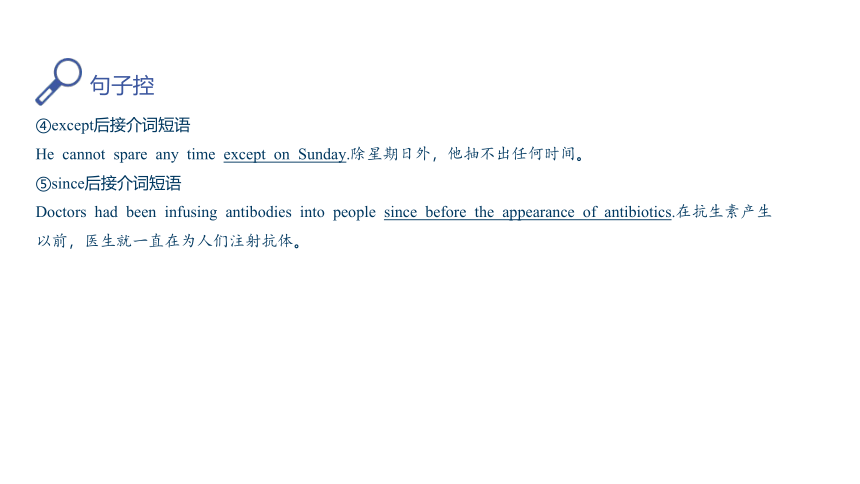
文档简介
(共23张PPT)
Unit 3
Food and Culture
Period Ⅱ
Learning About Language
敲黑板
1.语言知识:“介词+介词短语”结构,过去完成时和过去完成时的被动语态等。
2.语言技能:了解一些与食物有关的英语习语;在适当的情景下使用过去完成时及其被动语态。
必刷词汇
1.olive n.________________
油橄榄;橄榄树
2.fig n.________
无花果
3.ingredient n.________________________
(尤指烹饪)材料;成分
4.dough n.________
生面团
5.canteen n.____________
食堂;餐厅
6.brand n.____________
拓展 brand-new adj.________
品牌全新的
崭新的
7._______ n.(饭后)甜点
易混 _______ n.沙漠 vt.抛弃
dessert
desert
8.______ adj.稳定的;稳重的
反 ________ adj.不稳定的;易变的
派 ________ n.稳定
同_______ adj.稳固的;平稳的
stable
unstable
stability
steady
9.cafeteria n.____________________
联想 ①café n.________________②buffet n.________
自助餐厅;自助食堂
咖啡馆;小餐馆
自助餐
【句意】明朝以前的一些中国传统食物现在仍然受欢迎。
教材P28
&1& “介词+介词短语”结构
介词短语作另一介词的宾语是常见的语言现象。介词at, from, till, until, in, to, since, by, for, except等后均可跟介词短语作宾语。
①at后接介词短语
We usually have supper at about 5:30 pm.我们通常在下午五点半左右吃晚饭。
②?from后接介词短语
The phrase has been in wide use from before the 1950s.20世纪50年代前,这个词组就被广泛使用了。
Come out from under the table.从桌子下面出来。
③until后接介词短语
Don't tell him this news until after his birthday party.在他的生日派对结束之前,不要告诉他这个消息。
④except后接介词短语
He cannot spare any time except on Sunday.除星期日外,他抽不出任何时间。
⑤since后接介词短语
Doctors had been infusing antibodies into people since before the appearance of antibiotics.在抗生素产生以前,医生就一直在为人们注射抗体。
定向练
根据汉语意思用“介词+介词短语”结构完成句子。
1.她刚把门打开,一只猫就从门后跳了出来。(from)
She had no sooner opened the door than a cat jumped out ______ _______ ____ _____.
from
behind
the
door
2.她考完试之后再回家。(until)
She won't go home _____ _____ ____ ______.
until
after
the
exam
3.除了夏天外,这扇窗户从未被打开过。(except)
The window is never opened _______ ___ ________.
except
in
summer
4.自从考试不及格以后,他一直努力学习。(since)
______ _____ _______ ____ ______, he has been studying hard.
Since
after
failing
the
exam
1 过去完成时
1构成:had+动词的过去分词
2基本用法
(1)过去完成时表示“过去的过去”,即在过去某一时刻或某一动作之前已经发生或完成了的动作,常与时间状语“by+表示过去的时间”或before等连用。
By the end of last year, the collection of books in the rural library had increased to about 8,000 books.截至去年年底,这座乡村图书馆的藏书已增至8,000册左右。
The two didn't know each other well—Taylor had just moved to town a month or so before.这两个人并不太认识——泰勒大概一个月前刚搬到镇上。
(2)用于宾语从句、定语从句和状语从句中,表示主句和从句发生的动作有先后关系。动作发生在前的,用过去完成时;动作发生在后的,用一般过去时。
The woman said she had not only lost 125 pounds, but also raised $25,000 for homeless children.这位女士说她不但已经减了125磅,还为无家可归的孩子们筹集了25,000美元。
Mr White had worked in our school for nearly forty years before he retired last month.怀特先生上个月退休了,在这之前他在我们学校工作了将近40年。
(3)表示在过去某一时刻之前已经开始并一直延续到这一过去时刻的动作或状态,常和for, since, when等构成的时间状语连用。
I had been at the bus stop for 20 minutes when a bus finally came.当公共汽车终于来了的时候,我已经在车站等了20分钟。
They still hadn't had any news when I spoke to them yesterday.昨天我和他们交谈时,他们仍没有得到任何消息。
(4)有些动词用过去完成时可以表示过去未曾实现的希望、打算或意图,如hope, plan, think, intend, mean (打算)等。
I had hoped that we would do better this time, but we failed again.我本希望这次我们能做得更好,但我们又失败了。
I had planned for 30 guests, but only 10 arrived.我做好了招待30位客人的准备,可是只来了10位。
I had intended to get up when the clock went off, but my brain kept convincing me right back to sleep.我本打算在闹钟响起来的时候就起床,不过我的大脑总是说服我立即回到睡眠状态。
特别注意
过去完成时与一般过去时的区别
过去完成时以过去的时间为基点,强调动作或状态发生在“过去的过去”,强调与过去某一时间的关联;而一般过去时只表示动作发生在过去。
He said he had tried several times.他说他已经尝试过几次了。(said的动作发生在过去,而tried的动作在said的动作之前发生,即“过去的过去”)
He tried several times but failed.他曾尝试过几次,但是都失败了。(tried和failed的动作都发生在过去)
3 用于过去完成时的常用句式
(1)表示“一……就……”的“hardly/scarcely/barely… when…”和“no sooner… than…”等句式中,主句常用过去完成时。
Hardly had he begun to speak when the audience interrupted him.他一开始演讲,听众就打断了他。
Scarcely had he sat down when there was a knock at the door.他刚坐下就有人敲门。
I had barely started speaking when he interrupted me.我刚刚开始讲话,他便打断了我。
No sooner had the game started than it began to rain heavily.比赛刚开始,就下起了大雨。
(2)“It/This/That was the first/second/… time that…”表示“这/那是第一/二/……次……”,that从句用过去完成时。
It was the first time that a Chinese company had carried out the design and construction work for a World Cup stadium.这是中国企业首次承担世界杯体育场的设计和施工工作。
(3)“It was the+形容词最高级+名词 (+that)…”表示“这是……的最……的……”,that从句用过去完成时。
It was the best coffee (that) I had ever tasted.这是我曾喝过的最好的咖啡。
定向练1
一、根据汉语意思和括号内的提示词完成句子。
1.我当时正在给一组人做报告,同样的报告我之前已为其他六组人做过了。
I was giving a talk to a group of people then, the same talk I __________ (give) to half a dozen
other groups.
had given
[解析] 由于was giving为过去进行时,根据语境可知,设空处表示的动作发生在was giving这一过去发生的动作之前,故用过去完成时。
2.我的好朋友简上周刚结婚,婚礼花费比她原计划的多了3,000美元。
Jane, a friend of mine, who got married only last week, spent 3,000 dollars more than she
____________ (plan) for the wedding.
had planned
[解析] plan发生在got married 和spent之前,为“过去的过去”,故用过去完成时。
3.辛苦了一天后我刚上床睡觉,电话就响了。
I ____ (go) after a very hard day ___ the phone rang.
[答案] had hardly/scarcely/barely gone to bed; when或had no sooner gone to bed; than
4.已经完成作业的双胞胎被允许在操场上做游戏。
The twins, who __________________________ (finish), were allowed to play games on the playground.
had finished their homework
5.那是我第一次登上国际舞台。
That was the first time that ______________________________________ (step).
I had stepped onto the international stage
[解析] That was the first time that… 表示“那是第一次……”,从句用过去完成时。
二、在空白处填入括号内单词的正确形式。
1.Yesterday, by the time he arrived here, all the guests __________ (go).
had gone
[解析] 根据by the time he arrived here可知,此处表示“过去的过去”,应用过去完成时。
2.Writing out all the invitations by hand was more time-consuming than we _____________ (expect).
had expected
[解析] 句意为:手写所有的请柬比我们之前预想的要耗时更久。因为主句时态是一般过去时,所以从句表示“之前的预期”要用过去完成时。
3.A few days ago, I ____ (run) into my friend as he passed by.
ran
[解析] 根据时间状语A few days ago可知,此处应用一般过去时。
4.No sooner had she had time to sit and have a rest than her phone _____ (ring) again.
rang
[解析] No sooner… than… 结构中主句常用过去完成时,than引导的从句用一般过去时。
5.I got a rescue call from a woman in Muttontown.She __________ (find ) a young owl on the
ground.When I arrived, I _____ (see) a 2- to 3-week-old owl.
had found
saw
[解析] 根据语境可知,“发现(find)”这个动作发生在“接求救电话(got a rescue call)”之前,应用过去完成时,故第一空填had found。第二空所在句的句意为:当我到那儿时,我看到了一只两到三周大的猫头鹰。第二空单纯描述过去的事情,所以用一般过去时。
6.It was the most inspiring performance I ____________ (watch).
had watched
[解析] 句意为:这是我曾经看过的最鼓舞人心的表演。此处为“It was the +形容词最高级+名词(+that)…”句型, that从句用过去完成时。
2 过去完成时的被动语态
当句子的主语为谓语动词动作的承受者,并且该动作发生在过去的某一时刻或某一动作之前时,谓语动词应用过去完成时的被动语态。
构成:
(1)肯定结构:主语+had been done+其他成分.
(2)否定结构:主语+had not been done+其他成分.
(3)一般疑问句结构:Had+主语+been done+其他成分?
(4)特殊疑问句结构:特殊疑问词或词组+had+主语+been done+其他成分?
A rescue worker risked his life saving two tourists who had been trapped in the mountains for two days.一名救援人员冒着生命危险救了两个已经被困在山里两天的游客。
At that time in the USA, most families had just one phone at home, and wireless phones hadn't been invented yet.当时在美国,大多数家庭只有一部电话,无线电话还没有被发明出来。
Had the new plan been discussed before the meeting started 会议开始前讨论过这项新计划吗?
How many buildings had been destroyed when the earthquake ended 地震结束时有多少建筑物被毁?
定向练2
在空白处填入括号内单词的正确形式。
1.At the end of the meeting, it was announced that an agreement _________________ (reach).
had been reached
2.All the cash crops (经济作物) _________________ (export) before we placed an order.
had been exported
3.—How was your trip to New York, Jennifer
—Fantastic! That was the first time I _______________ (take) to such a big city. It's so impressive.
had been taken
4.John had to have his car repaired in a garage because it __________________ (damage) seriously.
had been damaged
5.I was sent to the village last month to see how the development plan ________________ (carry) out
in the past two years.
had been carried
Unit 3
Food and Culture
Period Ⅱ
Learning About Language
敲黑板
1.语言知识:“介词+介词短语”结构,过去完成时和过去完成时的被动语态等。
2.语言技能:了解一些与食物有关的英语习语;在适当的情景下使用过去完成时及其被动语态。
必刷词汇
1.olive n.________________
油橄榄;橄榄树
2.fig n.________
无花果
3.ingredient n.________________________
(尤指烹饪)材料;成分
4.dough n.________
生面团
5.canteen n.____________
食堂;餐厅
6.brand n.____________
拓展 brand-new adj.________
品牌全新的
崭新的
7._______ n.(饭后)甜点
易混 _______ n.沙漠 vt.抛弃
dessert
desert
8.______ adj.稳定的;稳重的
反 ________ adj.不稳定的;易变的
派 ________ n.稳定
同_______ adj.稳固的;平稳的
stable
unstable
stability
steady
9.cafeteria n.____________________
联想 ①café n.________________②buffet n.________
自助餐厅;自助食堂
咖啡馆;小餐馆
自助餐
【句意】明朝以前的一些中国传统食物现在仍然受欢迎。
教材P28
&1& “介词+介词短语”结构
介词短语作另一介词的宾语是常见的语言现象。介词at, from, till, until, in, to, since, by, for, except等后均可跟介词短语作宾语。
①at后接介词短语
We usually have supper at about 5:30 pm.我们通常在下午五点半左右吃晚饭。
②?from后接介词短语
The phrase has been in wide use from before the 1950s.20世纪50年代前,这个词组就被广泛使用了。
Come out from under the table.从桌子下面出来。
③until后接介词短语
Don't tell him this news until after his birthday party.在他的生日派对结束之前,不要告诉他这个消息。
④except后接介词短语
He cannot spare any time except on Sunday.除星期日外,他抽不出任何时间。
⑤since后接介词短语
Doctors had been infusing antibodies into people since before the appearance of antibiotics.在抗生素产生以前,医生就一直在为人们注射抗体。
定向练
根据汉语意思用“介词+介词短语”结构完成句子。
1.她刚把门打开,一只猫就从门后跳了出来。(from)
She had no sooner opened the door than a cat jumped out ______ _______ ____ _____.
from
behind
the
door
2.她考完试之后再回家。(until)
She won't go home _____ _____ ____ ______.
until
after
the
exam
3.除了夏天外,这扇窗户从未被打开过。(except)
The window is never opened _______ ___ ________.
except
in
summer
4.自从考试不及格以后,他一直努力学习。(since)
______ _____ _______ ____ ______, he has been studying hard.
Since
after
failing
the
exam
1 过去完成时
1构成:had+动词的过去分词
2基本用法
(1)过去完成时表示“过去的过去”,即在过去某一时刻或某一动作之前已经发生或完成了的动作,常与时间状语“by+表示过去的时间”或before等连用。
By the end of last year, the collection of books in the rural library had increased to about 8,000 books.截至去年年底,这座乡村图书馆的藏书已增至8,000册左右。
The two didn't know each other well—Taylor had just moved to town a month or so before.这两个人并不太认识——泰勒大概一个月前刚搬到镇上。
(2)用于宾语从句、定语从句和状语从句中,表示主句和从句发生的动作有先后关系。动作发生在前的,用过去完成时;动作发生在后的,用一般过去时。
The woman said she had not only lost 125 pounds, but also raised $25,000 for homeless children.这位女士说她不但已经减了125磅,还为无家可归的孩子们筹集了25,000美元。
Mr White had worked in our school for nearly forty years before he retired last month.怀特先生上个月退休了,在这之前他在我们学校工作了将近40年。
(3)表示在过去某一时刻之前已经开始并一直延续到这一过去时刻的动作或状态,常和for, since, when等构成的时间状语连用。
I had been at the bus stop for 20 minutes when a bus finally came.当公共汽车终于来了的时候,我已经在车站等了20分钟。
They still hadn't had any news when I spoke to them yesterday.昨天我和他们交谈时,他们仍没有得到任何消息。
(4)有些动词用过去完成时可以表示过去未曾实现的希望、打算或意图,如hope, plan, think, intend, mean (打算)等。
I had hoped that we would do better this time, but we failed again.我本希望这次我们能做得更好,但我们又失败了。
I had planned for 30 guests, but only 10 arrived.我做好了招待30位客人的准备,可是只来了10位。
I had intended to get up when the clock went off, but my brain kept convincing me right back to sleep.我本打算在闹钟响起来的时候就起床,不过我的大脑总是说服我立即回到睡眠状态。
特别注意
过去完成时与一般过去时的区别
过去完成时以过去的时间为基点,强调动作或状态发生在“过去的过去”,强调与过去某一时间的关联;而一般过去时只表示动作发生在过去。
He said he had tried several times.他说他已经尝试过几次了。(said的动作发生在过去,而tried的动作在said的动作之前发生,即“过去的过去”)
He tried several times but failed.他曾尝试过几次,但是都失败了。(tried和failed的动作都发生在过去)
3 用于过去完成时的常用句式
(1)表示“一……就……”的“hardly/scarcely/barely… when…”和“no sooner… than…”等句式中,主句常用过去完成时。
Hardly had he begun to speak when the audience interrupted him.他一开始演讲,听众就打断了他。
Scarcely had he sat down when there was a knock at the door.他刚坐下就有人敲门。
I had barely started speaking when he interrupted me.我刚刚开始讲话,他便打断了我。
No sooner had the game started than it began to rain heavily.比赛刚开始,就下起了大雨。
(2)“It/This/That was the first/second/… time that…”表示“这/那是第一/二/……次……”,that从句用过去完成时。
It was the first time that a Chinese company had carried out the design and construction work for a World Cup stadium.这是中国企业首次承担世界杯体育场的设计和施工工作。
(3)“It was the+形容词最高级+名词 (+that)…”表示“这是……的最……的……”,that从句用过去完成时。
It was the best coffee (that) I had ever tasted.这是我曾喝过的最好的咖啡。
定向练1
一、根据汉语意思和括号内的提示词完成句子。
1.我当时正在给一组人做报告,同样的报告我之前已为其他六组人做过了。
I was giving a talk to a group of people then, the same talk I __________ (give) to half a dozen
other groups.
had given
[解析] 由于was giving为过去进行时,根据语境可知,设空处表示的动作发生在was giving这一过去发生的动作之前,故用过去完成时。
2.我的好朋友简上周刚结婚,婚礼花费比她原计划的多了3,000美元。
Jane, a friend of mine, who got married only last week, spent 3,000 dollars more than she
____________ (plan) for the wedding.
had planned
[解析] plan发生在got married 和spent之前,为“过去的过去”,故用过去完成时。
3.辛苦了一天后我刚上床睡觉,电话就响了。
I ____ (go) after a very hard day ___ the phone rang.
[答案] had hardly/scarcely/barely gone to bed; when或had no sooner gone to bed; than
4.已经完成作业的双胞胎被允许在操场上做游戏。
The twins, who __________________________ (finish), were allowed to play games on the playground.
had finished their homework
5.那是我第一次登上国际舞台。
That was the first time that ______________________________________ (step).
I had stepped onto the international stage
[解析] That was the first time that… 表示“那是第一次……”,从句用过去完成时。
二、在空白处填入括号内单词的正确形式。
1.Yesterday, by the time he arrived here, all the guests __________ (go).
had gone
[解析] 根据by the time he arrived here可知,此处表示“过去的过去”,应用过去完成时。
2.Writing out all the invitations by hand was more time-consuming than we _____________ (expect).
had expected
[解析] 句意为:手写所有的请柬比我们之前预想的要耗时更久。因为主句时态是一般过去时,所以从句表示“之前的预期”要用过去完成时。
3.A few days ago, I ____ (run) into my friend as he passed by.
ran
[解析] 根据时间状语A few days ago可知,此处应用一般过去时。
4.No sooner had she had time to sit and have a rest than her phone _____ (ring) again.
rang
[解析] No sooner… than… 结构中主句常用过去完成时,than引导的从句用一般过去时。
5.I got a rescue call from a woman in Muttontown.She __________ (find ) a young owl on the
ground.When I arrived, I _____ (see) a 2- to 3-week-old owl.
had found
saw
[解析] 根据语境可知,“发现(find)”这个动作发生在“接求救电话(got a rescue call)”之前,应用过去完成时,故第一空填had found。第二空所在句的句意为:当我到那儿时,我看到了一只两到三周大的猫头鹰。第二空单纯描述过去的事情,所以用一般过去时。
6.It was the most inspiring performance I ____________ (watch).
had watched
[解析] 句意为:这是我曾经看过的最鼓舞人心的表演。此处为“It was the +形容词最高级+名词(+that)…”句型, that从句用过去完成时。
2 过去完成时的被动语态
当句子的主语为谓语动词动作的承受者,并且该动作发生在过去的某一时刻或某一动作之前时,谓语动词应用过去完成时的被动语态。
构成:
(1)肯定结构:主语+had been done+其他成分.
(2)否定结构:主语+had not been done+其他成分.
(3)一般疑问句结构:Had+主语+been done+其他成分?
(4)特殊疑问句结构:特殊疑问词或词组+had+主语+been done+其他成分?
A rescue worker risked his life saving two tourists who had been trapped in the mountains for two days.一名救援人员冒着生命危险救了两个已经被困在山里两天的游客。
At that time in the USA, most families had just one phone at home, and wireless phones hadn't been invented yet.当时在美国,大多数家庭只有一部电话,无线电话还没有被发明出来。
Had the new plan been discussed before the meeting started 会议开始前讨论过这项新计划吗?
How many buildings had been destroyed when the earthquake ended 地震结束时有多少建筑物被毁?
定向练2
在空白处填入括号内单词的正确形式。
1.At the end of the meeting, it was announced that an agreement _________________ (reach).
had been reached
2.All the cash crops (经济作物) _________________ (export) before we placed an order.
had been exported
3.—How was your trip to New York, Jennifer
—Fantastic! That was the first time I _______________ (take) to such a big city. It's so impressive.
had been taken
4.John had to have his car repaired in a garage because it __________________ (damage) seriously.
had been damaged
5.I was sent to the village last month to see how the development plan ________________ (carry) out
in the past two years.
had been carried
